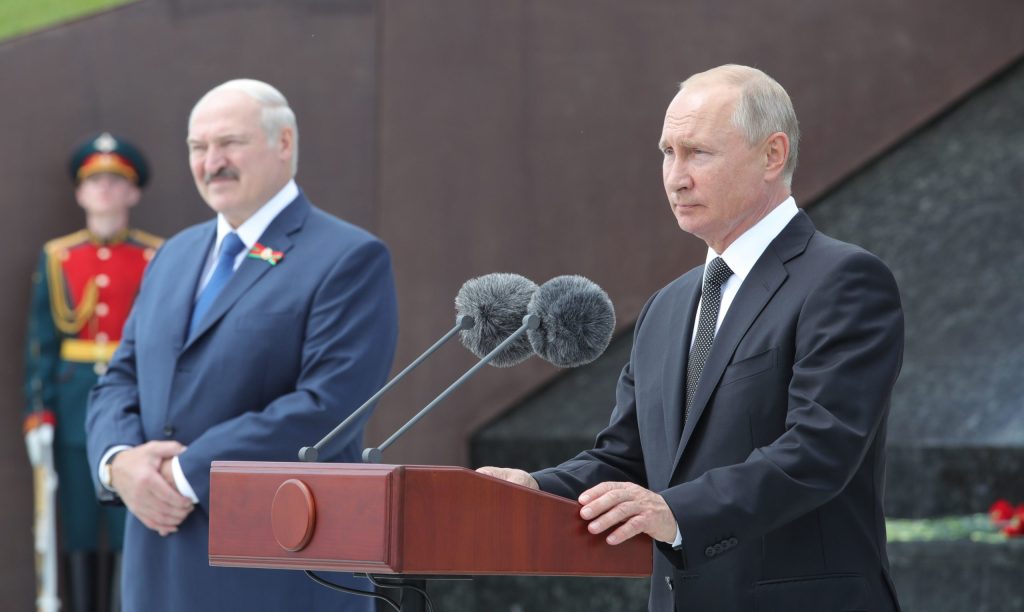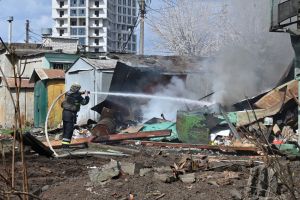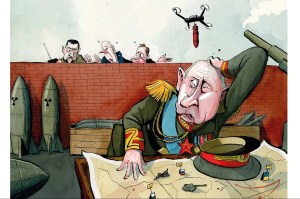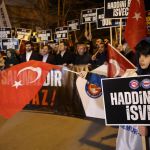Sometimes, Vladimir Putin just can’t help himself. Russian coverage of the popular revolution in neighboring Belarus has been unusually even-handed, perhaps reflecting a belief that strongman Alexander Lukashenko might be on the ropes. Then Putin, having been quiet about Belarus for so long, used an interview with a tame TV journalist to drop a bombshell: a reserve force has been established that could intervene.
Apparently Lukashenko had asked him ‘to create a reserve group of law enforcement personnel’ which could be deployed if ‘the situation becomes uncontrollable, when extremist elements…overstep the mark.’
He magnanimously continued that ‘we came to the conclusion that now it is not necessary, and I hope that it will never be necessary, ’but the implication is that if things turn ugly, Russia is willing and able to get uglier.
Why the escalation in rhetoric? We certainly shouldn’t assume that it signals that he is planning to intervene. After all, this would be a dangerous move with little support inside his own country, that would turn the Belarusian people against Russia.
Instead, it is classic Putin: keeping his options open, while seeing if a bit of bluster can get him what he wants without having actually to make good on his threats.
The hope is presumably that this may demoralize the protesters while heartening Lukashenko’s thugs. The former is unlikely, but it is also unlikely to be a coincidence that that evening, the security forces were out in Minsk, putting pressure on foreign journalists and making more arrests than we’ve seen for a while.
At the same time, Russia agreed to refinance a $1 billion loan to Belarus, providing a desperately needed breathing space to an economy that is struggling, with the Belarusian ruble and foreign currency stocks both under pressure. This way, Putin tries to force Lukashenko into the role of client governor, while behind the scenes the search goes on to see if there are any viable replacements as a potential ‘plan B.’
After all, what might this ‘reserve group’ actually be? Technically, Russia’s National Guard counts as a law-enforcement agency. As well as riot police it also includes the Interior Troops, a militarized security force that has its own helicopters, tanks and artillery. Given that it is more than 200,000 strong — Belarus’s entire military amounts to some 45,000 personnel — that could be quite some ‘reserve.’
But it’s unlikely it would come to that. Initial chatter was that the SSO, Russia’s answer to the US Delta Force, was being prepared for operations in Belarus. Much more likely is that Moscow would turn to the Alpha Group, an elite counter-terrorist force under the Federal Security Service (FSB). This is, again, technically a law-enforcement unit, also legally empowered to operate in Belarus under the Union Treaty between Minsk and Moscow.
What would a relative handful of special forces do against a crowd of protesters? Nothing that Lukashenko’s own heavies can’t. What they could do, though, is extract Lukashenko if he needed to be evacuated — or take him out, if Moscow decided he was more of a liability than an asset.
Because while Putin giveth, Putin may taketh away. He has no affection for Lukashenko, a man who for years played Russia against the EU and who just a month ago was trying to win votes at home and sympathy in the West by accusing Moscow of meddling in Belarusian politics. Driven by what he sees as the need to prevent Belarus from pivoting Westwards, though, Putin is willing to deal with the devil he knows.
[special_offer]
For now. With Lukashenko seemingly having weathered the immediate crisis – although with no remaining popular legitimacy, it is only a matter of time until the next one — Putin is willing to extend him some credit, give him an economic lifeline and the vague promise of help.
This is an overdraft, not a gift, though. If Putin the geopolitical loanshark comes to believe Lukashenko isn’t going to be able to pay back the debt, then he may find an excuse to use that ‘reserve’ to replace him with someone who will. A direct intervention is still highly unlikely, but we now have perhaps a better sense of what it might really look like if it does happen: not a mass invasion, but a surgical strike to effect regime change.
After all, it’s only business.
This article was originally published onThe Spectator’s UK website.


















